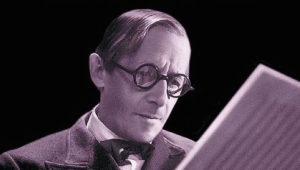
That’s it. Just sit and pretend nothing’s going on. You’re probably hearing something from a recent opera that you found out about some ten or more years ago and heard it in the flesh. This is who’s at fault! Some Russian who died before the Baroness von Meck brought you over there as a tutor.

Then your opera arrived and all the new experts were saying how much Boris Godunov influenced it, a silly idea that you quashed at once as these damn new fans start deciding your identity. But we’re going inside your head for a little adventure into the ending of your Pelléas et Melisande’s Scene 1:

Look at that expression! Poor photo image but we see what you’re up to!
Someone who knew you wasn’t fooled! D.E. Inghelbrecht had dinners with you and premiered your Martyrdom of Saint Sebastian and a short piece. He heard you play piano and talked about you at times on a weekly French radio program given over an eight year period, the last one taking place about a month before his death at age 85 in 1965.

Inghelbrecht often conducted your opera and here’s the finale from Scene 1:
Right away we smell Musorgsky! And Maestro Inghel was the first to perform the original version of Boris in Paris, having gained access to the original in a Soviet Archive in the 1920s.
We land onto the music preceding Pimen’s monologue as he puts the finishing touches onto his manuscript on how Boris murdered the infant heir to the throne in Uglich:
And what happened to our Debussy? Hear what he did!
Later when a striking clock sends Boris into an apoplectic fit that leads to insanity, the music dramatically introduces a new mood:
And right after Debussy’s taking on Pimen’s cowl he leaps into the musical madness but in a subdued fashion:
As if to put people off his train, Debussy thinks of the early coronation scene that begins soon after the police begin to beat the wretched populace with their knouts to fall in line and sing to the Tsar, the bells resonating amidst a delightful harmony considered barbaric by Western critics and the like on first exposure:
That sly Debussy: something so imposing is made light of:
Now that you’re familiar with these three liftings, return to the first example – Scene 1’s ending – and observe Debussy stringing together three disparate moments from Boris that became part of his language.
I dedicate this post to a bygone Schenker pupil who informed me that great composers must be studied exclusively through their own works, not to ever make references to others!
© Allan Evans 2019
all selections performed by the ORTF conducted by Inghelbrecht,
For further Debussy sounds (including his own playing) avail yourselves of our recent project:
